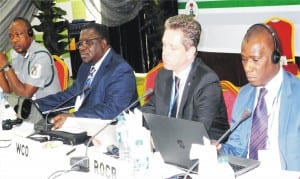Business
Foreign Firms Deprive Africa $11bn Tax Yearly – Oxfam
Oxfam International said in Washington that multinational companies deprive African governments of 11 billion dollars in taxes each year.
It, therefore, challenged G7 leaders to urgently set up a new global body to regulate corporate taxation.
Oxfam International Executive Director, Winnie Byanyima said yesterday that some of the multinational companies legally avoid paying taxes to the African countries, where they generate revenues, by shifting profits overseas to lower tax regimes.
He said by so doing they deprive governments of money they desperately need for development.
Byanyima said Oxfam based its calculation of the tax revenue Africa loses on a UN backed study released in April that estimated 50 billion dollars in illicit funds flow out of the continent each year.
He said much of it through corporate trade mispricing to avoid taxes or in transfers of money obtained corruptly, and this was almost double the official development aid Africa receives each year.
Byanyima said it was necessary for the leaders of the G7, countries to discuss how to support economic growth in Africa during their next meeting in Germany between June 7 and 8.
He said the vital component of their talks should be comprehensive reform of the global tax system.
“It is absurd that there are international organisations for trade, health and football but not for tax.
“An international body similar to the World Trade Organisation could represent all countries’ interests and mediate disputes among taxation regimes,” he said.
Claire Godfrey, Oxfam Senior Adviser and author of the report, said the G7 leaders, were already discussing how to make the global taxation system fairer.
However, developing countries complain that they have no seat at the table in those talks, even though they are the victims of the present system.
She said collecting more taxes would make them less dependent on aid.
Godfrey said tax reform would go a long way towards funding new commitments to improve schooling and healthcare.
“For example, G7-based companies alone avoid about 6 billion dollars a year in taxes due to African governments.
“This is more than three times the amount the Ebola-affected countries of Sierra Leone, Liberia, Guinea and Guinea-Bissau need to plug their funding gaps to deliver free primary healthcare,” she said.
Malcolm Damon, Director of Economic Justice Network for Southern Africa, said one quarter of South Africans go to bed hungry each night and a further 25 per cent were at risk of missing a meal.
He said African governments needed resources to reduce poverty at all levels.
The G7 summit would take place in Bavaria, Germany, and in July world leaders and ministers meet in Addis Ababa to consider how to finance the new development agenda.

L-R: Representative of Comptroller-General, Nigeria Customs Service, Mr Wale Adeniyi, representative of the Vice Chairman, World Customs Organisation (WCO), Mr Ebenezer Tafili, Regional Development Officer, WCO, Mr Bernard Zbiden and Regional Officer for Capacity Building, Mr Suleiman Sangare, at the 4th meeting of experts of the Conference of Directors-General of Customs in Abuja, recently.
Business
Nigeria’s ETF correction deepens as STANBICETF30, VETGRIF30 see 50% decline in a week

Business
BOI Introduces Business Clinic

Business
Dangote signs $400 mln equipment deal with China’s XCMG to speed up refinery expansion

-
Maritime3 days ago
Nigeria To Pilot Regional Fishing Vessels Register In Gulf Of Guinea —Oyetola
-

 Sports3 days ago
Sports3 days agoGombe-Gara Rejects Chelle $130,000 monthly salary
-
Maritime3 days ago
Customs Declares War Against Narcotics Baron At Idiroko Border
-
Maritime3 days ago
NIMASA,NAF Boost Unmanned Aerial Surveillance For Maritime Security
-

 Sports3 days ago
Sports3 days agoTEAM RIVERS SET TO WIN 4×400 ” MORROW” …Wins Triple jump Silver
-

 Sports3 days ago
Sports3 days agoNPFL Drops To 91st In Global League Rankings
-
Maritime3 days ago
NIWA Collaborates ICPC TO Strengthen Integrity, Revenue
-

 Sports3 days ago
Sports3 days agoNPFL Impose Fines On Kwara United Over Fans Misconduct

